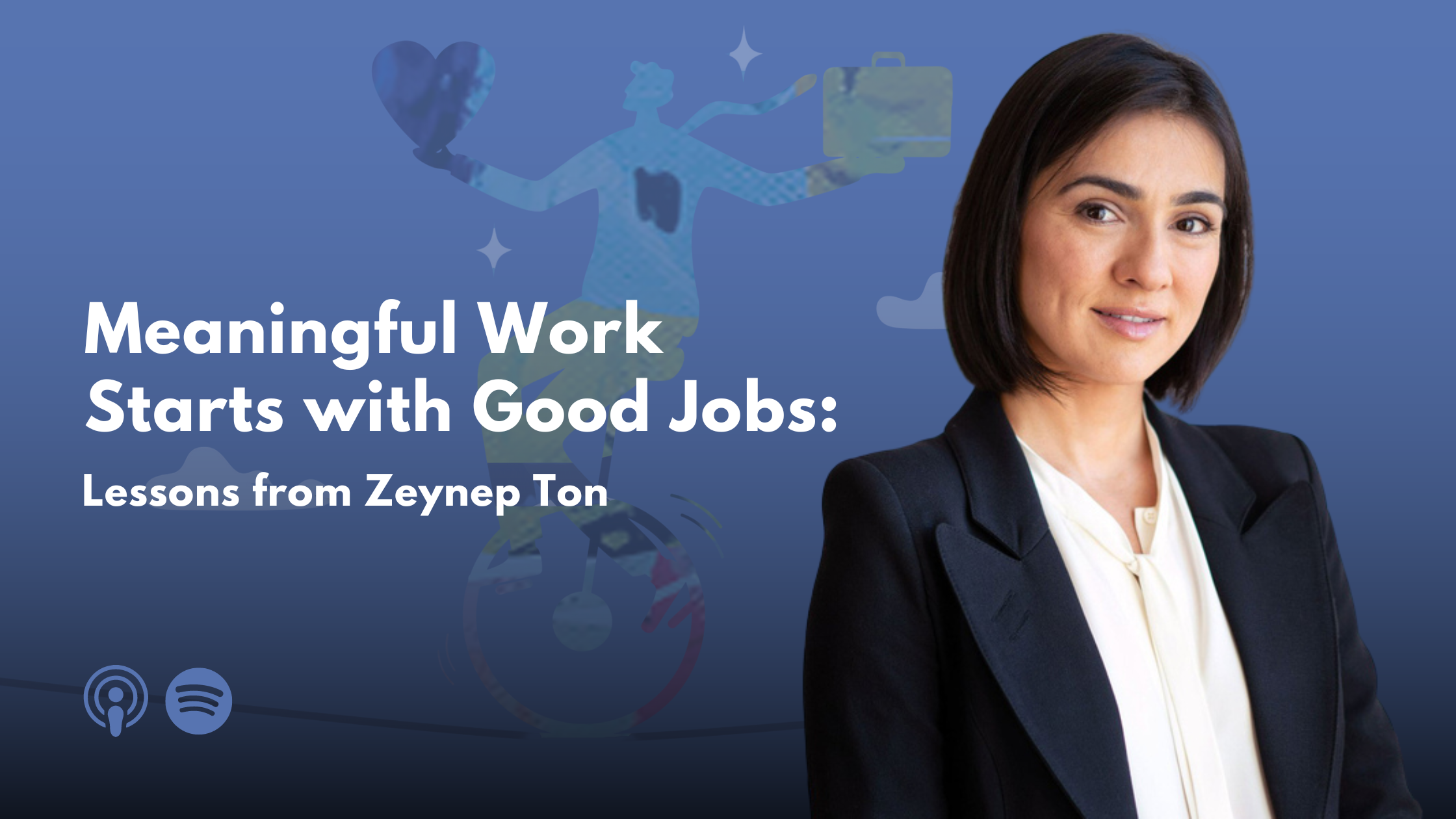For many, striving to make work more meaningful may seem like a privileged problem. After all, according to the Brookings Institute, in 2019, a whopping 44% of working Americans held jobs that earned less than $24,000 a year. The fact is, if we want work to be meaningful, it has to be decent first.
That means work should offer us freedom, equity, security, and dignity.
But what if we told you that decent work isn't just a lofty goal, but a proven strategy for achieving high profits and lasting success?
Zeynep Ton, a professor of practice at MIT Sloan and the president of the nonprofit Good Jobs Institute, is at the forefront of helping business leaders make realization.
In our latest episode, Zeynep unpacks the essence of her latest book, The Case for Good Jobs, which builds on her previous work, The Good Job Strategy, to explain how businesses can reap the rewards of investing in their employees as human beings, rather than as costs to be minimized.
Zeynep's research highlights employees are not mere cogs in the machine but rather invaluable contributors whose well-being and development are intricately tied to a company's success.
Adequate Pay: The Cornerstone of Meaningful Work
Low pay can set in motion a vicious cycle of high employee turnover and low productivity. Zeynep highlights the negative health effects that stem from high-stress jobs, including reduced cognitive function. Unfortunately, there exists a significant gap between the ideal of good work and the reality for many in the world. Low-wage work often forces people to hold multiple jobs, leading to physical exhaustion and a lack of time for family, health or education.
This glaring issue needs urgent attention, especially considering that future job growth is expected from low-wage sectors.
Investing in Employees: Costco and Trader Joe's Success
Zeynep's insights reveal that investing in employee pay and reducing turnover costs can yield substantial benefits for companies. High turnover rates and low wages lead to operational problems and lost sales, which can be costly in the long run. Drawing from successful retail chains like Costco and Trader Joe's, Zeynep showcases how improving job conditions and retaining employees can translate into significant financial gains.
She notes the discomfort that often fills the room when company data related to employee turnover and living wages are presented. Most executives are not proud of the number of employees not earning a living wage in their companies.
Designing Work for High Productivity
Zeynep’s Good Job Strategy emphasizes the need to design work for high productivity and contribution. She points out that many companies struggle to achieve their desired outcomes due to siloed decision-making and a lack of alignment among leaders.
However, companies that have embraced this strategy have witnessed significant improvements in employee turnover, productivity, and customer satisfaction. To achieve these outcomes, Zeynep advocates for a system change that prioritizes customer success, operational execution, team building, and turnover reduction.
Employee Trust and Belief Barriers
Breaking down the barriers to adopting a new system requires a profound shift in employee belief and trust. The significance of trust in employees' competence and the impact it can have on organizational success. Companies like Four Seasons, which invest in their frontline employees and trust them to make decisions, serve as successful examples.
Zeynep suggests that executives spending time with frontline employees can build empathy and a better understanding of the incredible competence of employees, even within a suboptimal system.
Unlocking Success Through Positive Deviance
Zeynep's approach involves studying companies that are true positive deviants in their industries and learning from their strategies. The focus is on creating genuine value for customers and continually improving that value, which demands a disciplined approach.
Zeynep stresses the importance of treating employees well, making integrity a habit, and giving back to customers. To implement a good job strategy within an organization, the first step is to make the status quo unacceptable, either competitively or ethically. Change is challenging, especially for those lower down in the organization, and it requires alignment in senior leadership. Failure to shift the way organizations think about their talent can lead to a loss of valuable employees.
Zeynep's extensive research and insights offer a roadmap for businesses to embrace a new way of thinking, where employees are valued, and their well-being is prioritized. By designing work for high productivity, overcoming barriers to employee trust and belief, and learning from positive deviants, we can usher in an era where meaningful work is a reality, not just a concept.
Meaningful work is not just a trend; it's a necessity for a brighter future where employees and businesses thrive together.
Resources:
The Case for Good Jobs: How Great Companies Bring Dignity, Pay, and Meaning to Everyone's Work
Meaningful Work, Well-Being, and Health: Enacting a Eudaimonic Vision







